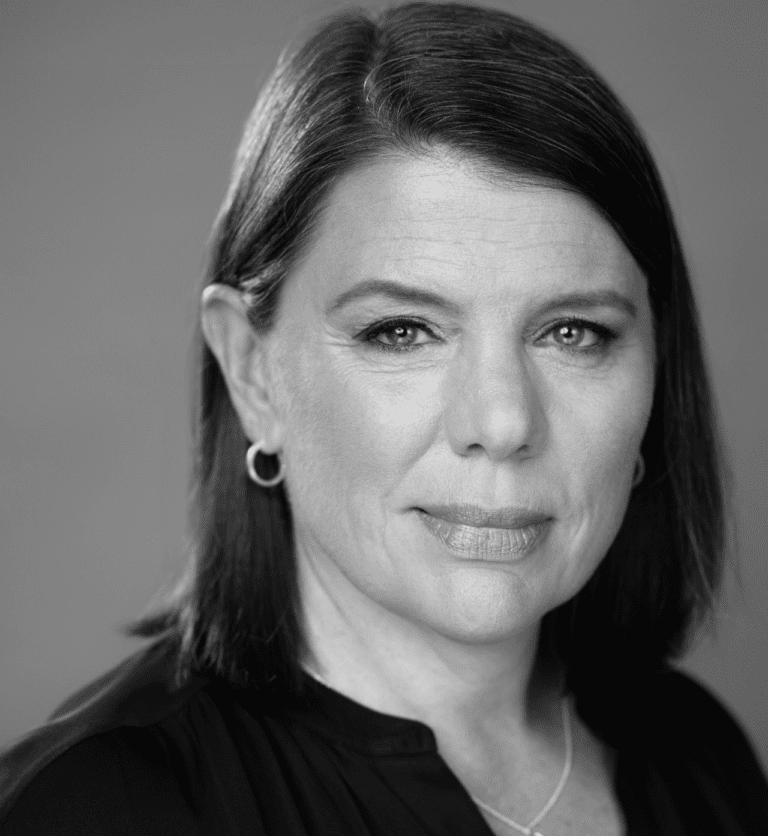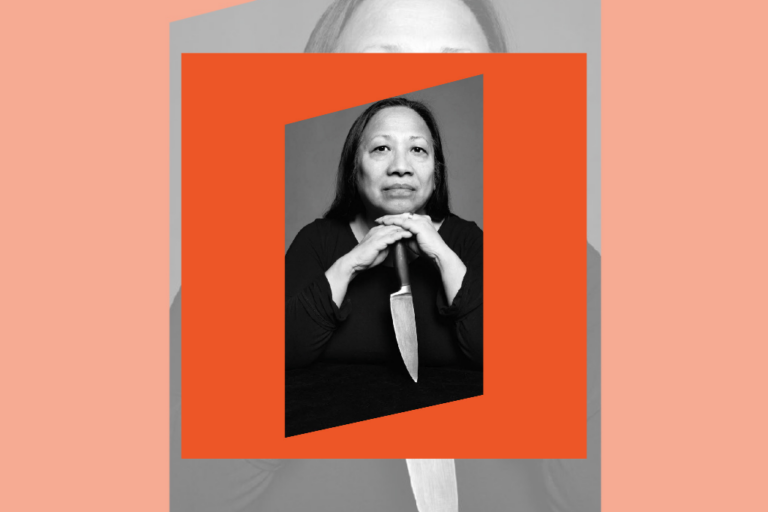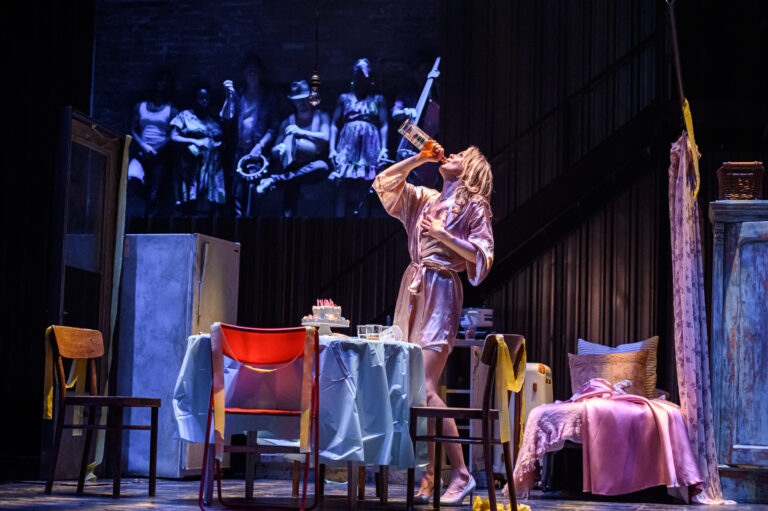REVIEW: among men at Factory Theatre
The following review is a conversation between theatre critics Joshua Chong and Karen Fricker. Joshua and Karen both attended among men on the evening of Friday, April 29, 2022.
The following is a transcription of Joshua and Karen’s conversation, which took place over Zoom on the morning of Saturday, April 30, 2022. It has been edited for length and clarity.
Karen Fricker (KF): To start off, I’m curious: Josh, you stayed for the talkback, and I wasn’t able to. How was it?
Joshua Chong (JC): It was incredibly insightful. The audience had some fantastic questions: it seemed that there were some academics in the audience, some fans of CanLit.
One of the questions that struck me was about the toxic masculinity inherent in this play. In one scene just beyond the halfway mark, Milton Acorn is sitting on the chair and opening up to Al Purdy — it’s one of the few scenes where he’s truly vulnerable. He shares a memory from his childhood about his sister, when her community surrounded her with support when she was vulnerable. She was embraced and hugged and loved. And he never really had that space.
The dramaturg, Matt McGeachy, said that everyone in the audience should read the play when it’s published because David Yee’s stage directions are so precise. In that moment, the stage directions say that after Milton’s monologue, Al leans in, and is about to embrace Milton and give him a hug. But then he backs off, and he doesn’t know what to do. So he just lights a cigarette, and then the play moves forward.
So that kind of tells you a bit about the masculinity, the toxicity, and how these characters struggle to open up and be vulnerable. That was a really powerful moment for me.
KF: This reminds me of another powerful moment. The premise of the play is that the two poets are together in Prince Edward County, building Al’s A-frame home, which has since become a well-known location. There’s comedy in how Al is inept with his hands, whereas Milton is almost effortlessly skilled — this is part of the play’s presentation of different performances of masculinity.
Al needs to put in electricity, and he dynamites a hole in the ground. When the sound goes off, Milton freaks out. We know they’ve both been in the military, and it becomes clear that there’s some kind of PTSD situation going on. Al puts his arms around Milton to calm him down, and they hold that embrace for a while.
I found that to be a really beautiful moment of care. And it was interesting that it had to be an extreme situation of a panic attack that led them to be able to touch each other. It made me think about what this play is actually about, because I do have a concern about its…aboutness. I’m not sure what the drama is, what the conflict really is.
But I do think it’s a play about love. One of the positive takeaways I had from among men is its wrestling with love.
JC: I think that’s exactly it. How do these men who are down on their luck grapple with love? Al Purdy is in the middle of his life and feels like he’s gone nowhere. He has few friends. His wife, who isn’t really mentioned much in the play, isn’t here. Milton is the only person he can really lean on.
David Yee doesn’t really paint them in a very flattering light, especially at the beginning. At that point they barely even seem to like each other… they’re bickering. Al is putting down Milton. He feels Milton is the superior poet — there’s a lot of self-hatred. He wants to burn his poems. But of course, we’re looking at this play, which is set in the late 1950s, knowing Al would later win the Governor General’s Award. He became, arguably, the more famous poet of the two: if you ask people on the street, they’re more likely to know Al than Milton, although Acorn also won the Governor General’s Award as well. It’s interesting David Yee decided to set this play in a time just a few years before Al Purdy found his voice.
KF: In a Toronto Star preview piece, Sue Carter interviewed David Yee, and he talked about one specific poem by Al Purdy called “House Guest”, which is understood to be about Milton Acorn. Lots of details from that poem ended up in the play. They cook eggs together, they drink their faces off.
I feel like there is a project here on Yee’s part to engage with these real-life figures, to uplift their stories and ask us to reconsider these figures from the recent past. Maybe it’s so they’re not forgotten, or so we consider their contributions through different angles, particularly through the lens of masculinity. I feel like the play depends on spectators’ knowledge that they do succeed eventually.
JC: I agree: the play really rests on the audience’s understanding of where their careers went after and how Purdy in particular found success. And I feel like Yee was really drilling down and picked this moment because it’s rock bottom. Right when he gets a rejection letter about his play, he is willing to burn his poetry anthology, just dump it in the fire, because then at least it’ll be good for something, or so he says.
KF: In terms of setting up the toxic masculinity, that first scene where Milton is telling a story, which, spoiler alert, we eventually find out is a dream, involves him being fellated in the front row of a poetry reading. I found it uncomfortable — I think it’s meant to be uncomfortable. We see these guys bonding by talking about crude sexual fantasy.
I guess what I’m dancing around is the fact that although I enjoyed David Yee’s writing, and I enjoyed the production — it looked stunning, it sounded stunning — I felt it was a play in search of a dramatic arc. How would you respond to that, Josh?
JC: I think so too. I found it was circling an idea rather than landing upon it. It’s a really slow burn. And it requires the audience to lean in and really invest in it. If you’re not listening or are ever inattentive, you can easily just become distracted and fall off this journey.
The first bit of the play heavily focuses on Al — I didn’t immediately get a sense of who Milton was. We never really get to see who Milton was for those first twenty minutes. But then, after that, it shifts to Milton. And then we learn that Milton, who for the first twenty minutes of the play I thought was incredibly self-assured, is seeking love and can’t find love out there, so he’s really unsettled. That discrepancy is partly Carlos Gonzalez-Vio’s excellent performance as Milton: he has this really deep voice, almost like a radio broadcaster, and he’s really confident. But then we kind of see that break down a bit.
KF: What Yee is circling and what these characters are circling is an inability to communicate, an inability to overtly share words of love.
among men is a delicate undertaking. There’s intimacy, there’s drama, but I felt the play might have benefited by bringing conflict closer to the surface.
JC: Much of the play focuses not on what’s expressed but rather what is not expressed. In a lot of the scenes it’s not important what Al or Milton show each other, but rather what they don’t show each other — that tension.
KF: Let’s talk about the physical production. Joanna Yu’s set is breathtaking. You walk in and you get to sit there and look at this stunning half-built A-frame. It was so satisfying to be back at Factory for their first live staged production since COVID: among men so revels in the physicality of stagecraft. Michelle Ramsay’s lighting is specific and perfect: there are hung objects that come into focus, and how that happens is perfectly timed. Christopher Stanton’s music is beautiful, and totally appropriate as underscoring. It’s never overbearing.
JC: I think Joanna Yu’s set is the real winner here. It captures the essence of the play — the idea of incompleteness. An A-frame cottage that would become so famous later on, and where Al Purdy would write his best work. On one side there’s a beam that goes up, and then on the other side, there’s another beam that comes down but it’s cut off. And there are pieces of wood in the hardwood floor that are missing. So there’s a sense of unfinishedness to it.
I think that unfinishedness is what David Yee is going for in this play. These two men are in the middle of their lives, but they feel that there’s unfinished business and that their careers are incomplete. They’re still searching for that next poem. The scenes in this play often are incomplete. They never really end. Most times, someone says something but the other doesn’t know how to respond, so then we just move on. The set really captures that visually.
And in terms of Nina Lee Aquino’s direction, I think she uses the set so well. There’s real intimacy to how she’s staged some moments. That scene where Milton has an episode of PTSD: Michelle Ramsay’s lighting and the set make that come alive. And the way that moment was handled by both actors and by Nina was incredibly moving and real for me. Carlos did go into that moment in the talkback because a lot of audience members were really affected by it, asking how he taps into that moment which is so raw. He talked about how interesting Milton’s life was, and the process of putting himself into Milton’s shoes to capture that moment so vividly.
KF: For me, the performances started loud. It started a little shouty for me, and I was wondering where we were going with that. Eventually the performances settled down, and it hit a place where the performances were in balance with the other elements. The actors, Ryan Hollyman as well as Gonzales-Vio, are both excellent; their performances are well-crafted and believable.
I’d be curious again to see Yee’s stage directions about how he conveys the passing of time. The production depicts this through increasingly exaggerated sequences of pour, pour, drink, drink, pour, drink, pour, drink. I was slightly disappointed by that because other aspects of the physical production were so precisely observed, but the repeated actions such as cooking, brewing coffee, and consuming alcohol were shorthanded.
But perhaps that was necessary — any more detail might have become laboured. Did you have a response to these choices, Josh?
JC: I was frustrated by those scene transitions as well. Of course, their drinking habits — they’re both alcoholics, right? It plays a huge part in the play and toxic masculinity. I wish they could have addressed it more within one of the scenes, rather than just stuffing it into the scene transitions. And the scene transitions could have offered a moment to breathe in between the scenes, but I felt that they were just crammed and it was almost like hyperspeed.
KF: It’s interesting to talk about alcohol abuse. And also, Milton never stops smoking a cigar, Al frequently lights up a cigarette. These guys were hard drinking, hard smoking, occasionally sexist — behaviours and characteristics that were perhaps of their time, and which Yee has chosen not to explore or complicate, but rather to present.
The subject matter here is creativity, self-expression, the inability to express intimacy. All those things are interconnected with alcohol — and it’s worth noting Gwendolyn MacEwen, who is mentioned a few times in the play and who Acorn eventually married, died of alcohol abuse. There is no overt discussion, though, about the role of drinking in their lives.
JC: There was one moment that was really clear and I really loved. Towards the end of the play, when Milton was frantically pacing up and down from stage left to right and trying to grab those pieces of paper hung from Joanna Yu’s set. But he just can’t grab it. He’s jumping, trying to reach the poetry. I thought that was a really powerful moment, which for once demonstrated the futility of their lives in that moment. That was a moment Yee smartly chose to express rather than bury in subtext.
KF: And then Milton gets to a point of heroic articulation where he stands on a crate and recites one of his poems. I felt like the pacing was building up to this breakthrough, which ends up being the play’s climax.
JC: I will note that it is at times a frustrating play. I could sense that from the audience as well. There were two people beside me that walked out in the middle. And I get it, especially if you’re not particularly invested in CanLit or are very familiar with these two people in Canadian history. I’m still asking myself why, why these two historical figures? They’re not particularly famous. Maybe it’s my lack of understanding about CanLit and Al Purdy and Milton Acorn.
KF: On the night we saw it, there was a lot of enjoyment of the physical business, the comedy, Al’s ineptness. Those moments seemed to land in a satisfying way with a number of audience members.
I’m a big enthusiast of David Yee’s playwriting, and I’ll always go out of my way to see one of his shows. This is one of a number of his recent plays, including Rochdale, focusing on the exploration of a particular location and its histories. So I think it’s right to talk about the set and the location as the centre of the play.
JC: You’re much more familiar with Yee’s work than I am, but I know this is the umpteenth collaboration between Yee and Nina Lee Aquino as director. So I want to know — what are your thoughts about Nina’s interpretation of Yee’s work here, and how does it compare to her other productions of Yee’s plays? I know they’re very close friends and collaborators.
KF: Yee is very witty and has a very distinct voice — sardonic, almost hyper-articulate. Nina’s very good at allowing the cleverness to land without overplaying the comedy. We really see that at work here. It’s a simpler play than others of his Nina has directed.
Just to finish off, as we’ve said, I think this play will attract, and rightly so, folks with deep investments in Canadian poetry and CanLit. There’s an interesting thing there for these two mid-career artists, Nina and David, who’ve been successful in their careers and have done important work and forged important ground — they’re dealing with artists who aren’t yet successful. There’s an inside joke in the play, I think, about the poets resenting not having won the “GG” – the Governor General’s Award – something which Yee himself has won.
JC: This is for people who are familiar with CanLit, who want a slow burn. There’s nothing really in-your-face in this production. It’s a simple two-hander. You have to lean in and be attentive and let it just wash over you.
among men runs at Factory Theatre through May 15, 2022. Tickets are available here.












Comments